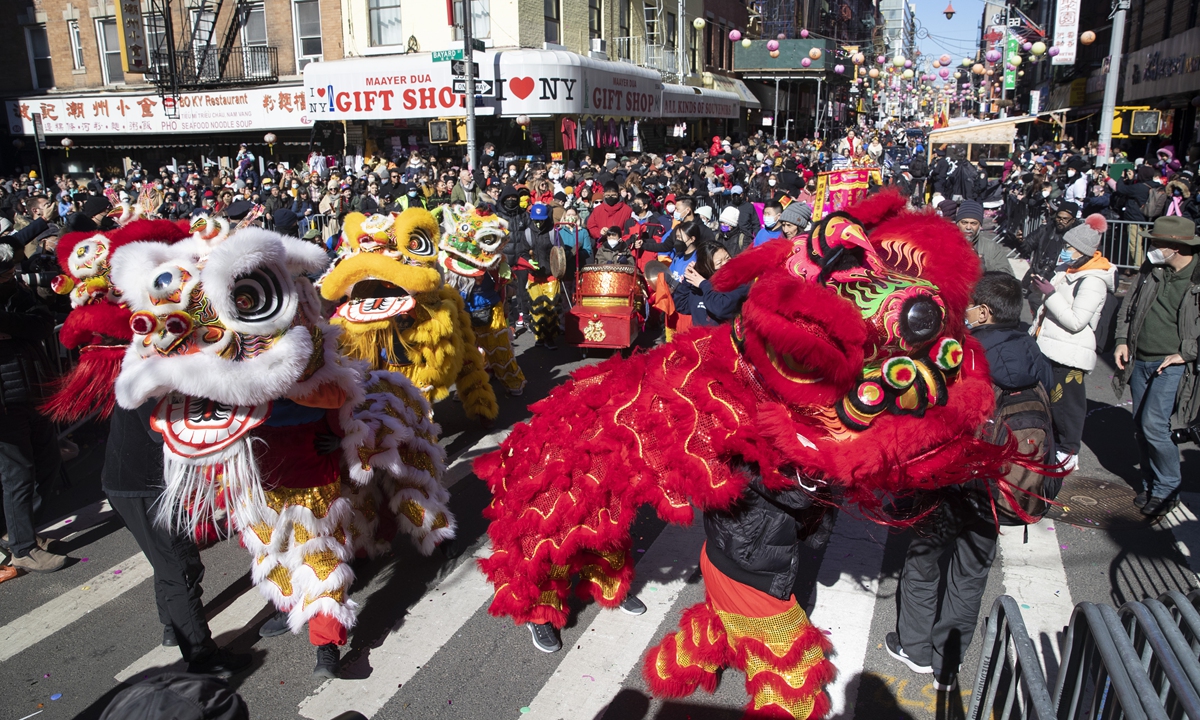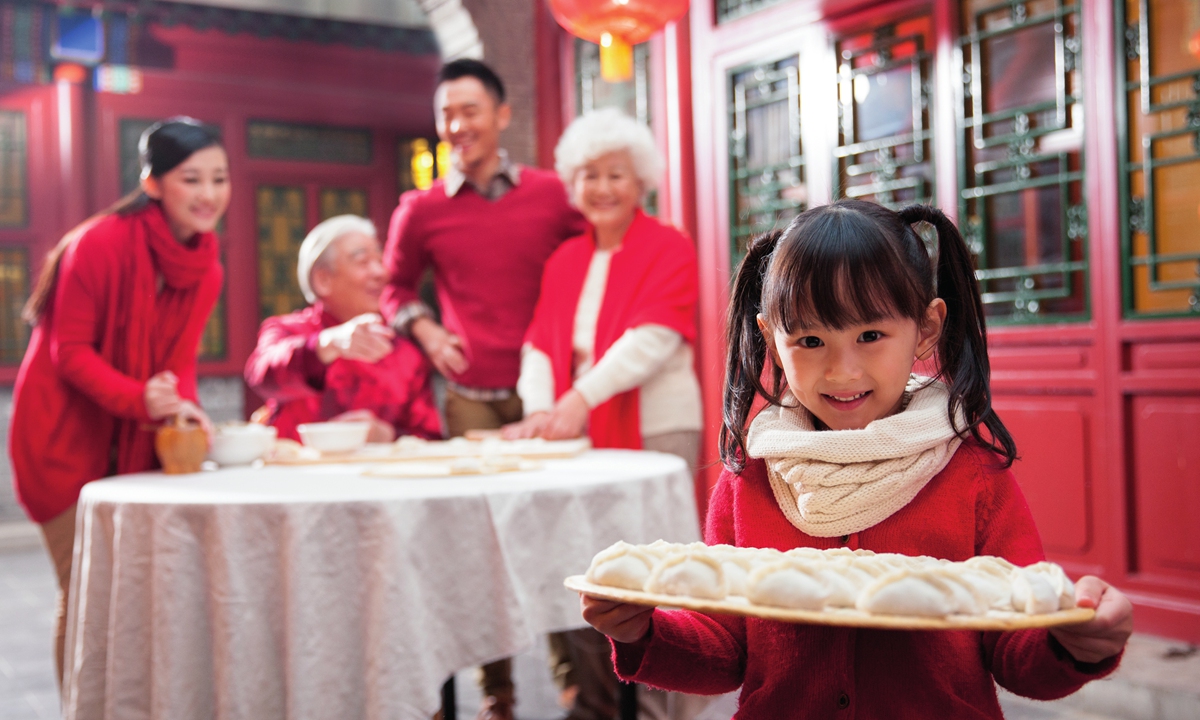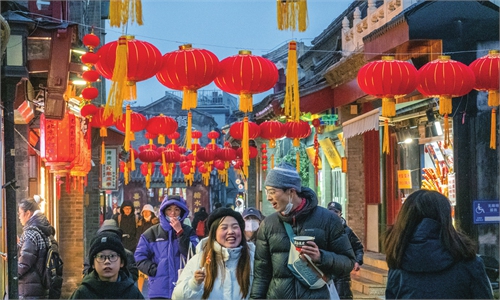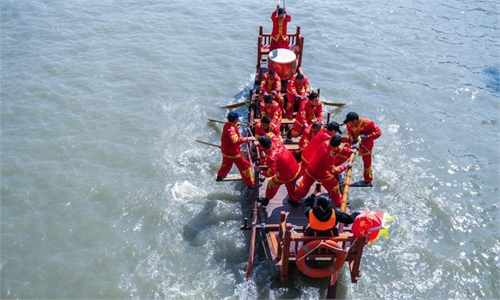
People celebrate the Chinese New Year in the Manhattan Chinatown in New York City, the US. File photo: VCG
Editor's Note:
The Spring Festival is one of the most important holidays on the Chinese calendar. People living in China and around the world are looking forward to embracing the holiday with their hopes for a better future, especially at a time when the world is recovering from the COVID-19 pandemic.
With a history of more than 2,000 years, the Spring Festival, or chunjie, is still celebrated by billions of people. The festival has been continuously enriched by the many ethnic groups in China, evolving over the centuries to finally become a common festival for the Chinese nation.
Starting from neighboring countries like the Koreas and Japan, the Spring Festival followed in the footsteps of cultural exchanges, growing to become an important part of East Asian culture. Thanks to China's economic and cultural strength, the Spring Festival is now becoming a symbol of global culture.
In this three-issue series, the Global Times will explore and present the Spring Festival today and how it is becoming a global festival full of vitality.
Red lanterns, Spring Festival couplets, paper-cuts, Chinese knots… Signs of the Spring Festival, more commonly known outside of China as the Chinese New Year, can be seen everywhere around the world, immersing people around the globe in the spirit of traditional Chinese culture.
Chinese culture experts told the Global Times that Chinese New Year folk customs spread around the globe through the Ming Dynasty (1368-1644) treasure voyages dating to the early 15th century as well as the wide footsteps of Chinese heading overseas, which makes it an important cultural symbol in East Asia and then the world as China's national strength increased.
"The Chinese New Year is bestowed with an inclusive and amiable nature. The beautiful significance of reunion, joy, harmony and blessings are loved by people all over the world," Yu Jinlong, a cultural critic based in Beijing, told the Global Times.
Beautiful implications
Many countries including South Korea, Indonesia, Thailand, Malaysia, Vietnam and Singapore have made the Chinese New Year a public holiday.
Cai Shenglan, a Chinese woman who will celebrate the Chinese New Year in Thailand for the first time, told the Global Times she feels like that she is back home by engaging in tradition. The great variety of Spring Festival activities have made her feel that the festival has been "ingrained into Thai culture."
Zheng Changling, secretary-general of the China Folk Culture Innovation and Development Center and a research fellow at the Chinese National Academy of Arts, told the Global Times that the Chinese New Year has become an international festival, and the reason is mainly due to its cultural attributes.
The festival embodies China's cultural spirit and human brilliance, including the Chinese concepts of family, respect for one's ancestors and reunion and harmony, which is what the contemporary world urgently needs in terms of sustainable development.
In 2022, Recife, the fourth-largest urban area in Brazil, also made the Chinese New Year an official city festival.
With the approach of the first official Chinese New Year holiday, the city is scheduled to hold a series of activities such as singing, lion and dragon dance performances and a large light show as part of celebrations.
Lu Gongrong, president of the Overseas Chinese Association in Brazil and an Honorary Citizen of Recife, told the Global Times that he was very proud to be Chinese and that the law passed thanks to China's enhanced influence around the world.
He said he was very pleased to see more Brazilians show interest in Chinese culture and want to learn more about China.
The Chinese New Year carries the unique charm of Chinese culture.
For a long time, people in the West have been full of curiosity about the ancient country. With the wide spread of Chinese culture around the world, more people outside of China have started to learn Chinese and the Chinese New Year can be a good opportunity for them to perceive the charm of Chinese civilization, Yu noted.
Shah Nishith Avinash, the director of the India China Academy for Teaching Chinese in Mumbai, told the Global Times that the members of the academy will celebrate the festival with dancing, calligraphy, Chinese poetry and other traditional celebrations and that the students have been very excited for it.
Enhanced influence worldwide
Cultural critics point out that as an important engine of the global economy, China has captured the attention of many countries with its increasing national strength and soft power and that their desire to celebrate the Chinese New Year is a manifestations of this attention.
Dragon parades, fireworks and issuing zodiac stamps have become well-known and symbolic activities in many Western countries such as the US, Australia, France and the UK.
Alice, a French woman in Paris, told the Global Times that she was very excited to watch a street performance of the dragon dance and that she planned to participate in a Chinese New Year DIY card event held at the Asian art museum Musée Cernuschi.
Chen Qingkai, president of the Chinese Students and Scholars Association in Cambridge, and Zheng Jin, director of the 2023 Cambridge Chinese Spring Festival Gala, told the Global Times that the 2023 Gala will be held at the Corn Exchange, one of the UK's most popular music and arts venues, on Tuesday for the Chinese students and scholars in Cambridge. Peking Opera, traditional dance and many other traditional Chinese performances will be held at the gala.
"The brilliant international celebration of the Chinese New Year once again proves the infinite charm of Chinese culture, and the profound influence of China's 5,000-plus years of civilization," said Zheng Changling.







